 Petzlover
Petzlover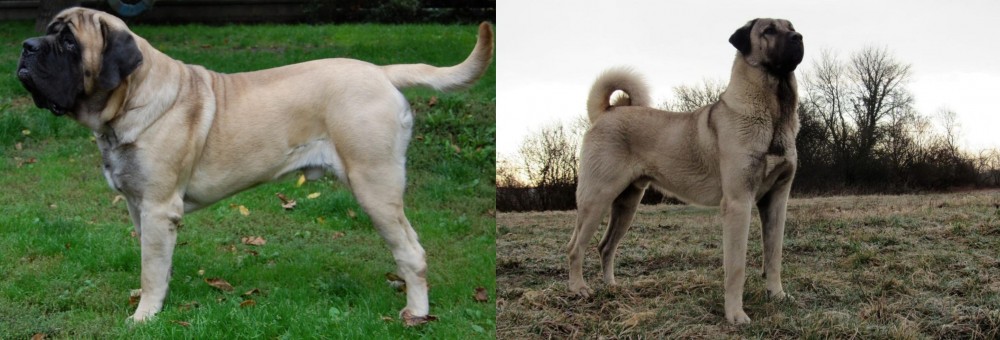 English Mastiff is originated from United Kingdom but Kangal Dog is originated from Turkey. English Mastiff may grow 9 cm / 3 inches shorter than Kangal Dog. English Mastiff may weigh 50 kg / 111 pounds more than Kangal Dog. English Mastiff may live 3 years less than Kangal Dog. Both English Mastiff and Kangal Dog has same litter size. English Mastiff requires Low Maintenance. But Kangal Dog requires Moderate Maintenance
English Mastiff is originated from United Kingdom but Kangal Dog is originated from Turkey. English Mastiff may grow 9 cm / 3 inches shorter than Kangal Dog. English Mastiff may weigh 50 kg / 111 pounds more than Kangal Dog. English Mastiff may live 3 years less than Kangal Dog. Both English Mastiff and Kangal Dog has same litter size. English Mastiff requires Low Maintenance. But Kangal Dog requires Moderate Maintenance
 Throughout most of history there have been images created by people of very large, sturdy dogs that they shared their space with. The English Mastiff can trace some part of her ancestry to these same dogs. This breed is thought to have come from the stock of ancient breeds such as the Alpine Mastiff, Pugnaces Britanniae and Alaunt. The Mastiff in general has then become a main descendent of many other breeds of dogs since the 1880’s. The images of these types of dogs goes back to the 5th and 6th century.
Throughout most of history there have been images created by people of very large, sturdy dogs that they shared their space with. The English Mastiff can trace some part of her ancestry to these same dogs. This breed is thought to have come from the stock of ancient breeds such as the Alpine Mastiff, Pugnaces Britanniae and Alaunt. The Mastiff in general has then become a main descendent of many other breeds of dogs since the 1880’s. The images of these types of dogs goes back to the 5th and 6th century.
There is no genetic evidence linking these dogs to the modern Mastiffs and the English Mastiff, but the resemblance is obvious. There is anecdotal evidence that these Mastiff type dogs were exported from England – the English Mastiff – to Greece to hunt game but were also used as war dogs by the Celts. The Alaunt was probably used the Normans and bred by the Alans. Writings and images throughout these times depicted a dog that looked very much like today’s English Mastiff. Some speculate that the English Mastiff came to the United States of the Mayflower.
There was a decline in the English Mastiff in its homeland in the 1800’s following the Cruelty to Animals Act of 1835 which prohibited owners and trainers from baiting animals. Then in the 19th century, prior to the first World War, systematic breeding programs began with J.W. Thompson. His first English Mastiff was a female named Dorah. Dorah’s ancestors included dogs from Thompson’s Grandfather. Captain John Garnier of the Royal Engineers also had dogs that contributed to the development of the English Mastiff.
During this time some breeders got away from pure type and began to breed for other factors. In the late 1800’s, Edgar Hanbury and Mark Hanbury Beaufoy began restoring the breed to its original soundness. One of their dogs was exported to the US were breeding to soundness continued until the First World War reduced the number of English Mastiffs around the world. By the time the war ended there were no English Mastiffs outside of England.
There was a dog in Canada named Beowulf and direct descendent of imports from Britain, who came to the States after the war and began to re-establish the breed on this continent and registered with the American Kennel Club. Yet as of 1945, the contribution from North
Breeding was stopped again for World War II and started again after the war. Many of these puppies died of distemper. Only one female had pups that were able to grow up into adults. North America sent dogs to England at this time and all of the Mastiffs from that time, could be traced back to Nydia and the 14 North American Mastiffs. Since then the breed has been restored slowly in Europe, North America and everywhere in the world.
The English Mastiff is known by his massive head with a black mask and comes in a wide variety of colors. He is also known as a gentle giant because of his personality and the love he has for his people.
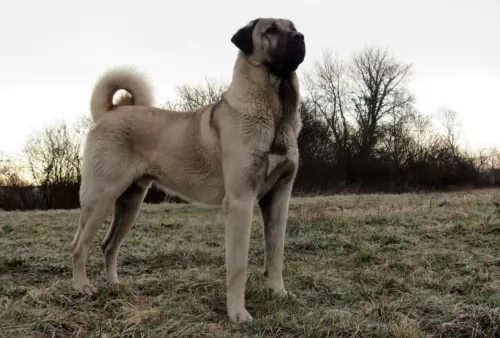 The magnificent looking Kangal Shepherd Dog, a purebred Mastiff type dog, is often referred to as a sheep dog and hails from the Sivas province of Turkey.
The magnificent looking Kangal Shepherd Dog, a purebred Mastiff type dog, is often referred to as a sheep dog and hails from the Sivas province of Turkey.
The Kangal Dog is a distinct breed and the National Dog of Turkey. These are working dogs who made their appearance in the UK in 1965.
It is interesting to note that in June 2018 the Turkish Kennel Club, Köpek Irklari ve Kinoloji Federasyonu, classifies Kangal Shepherd Dogs to be the same population as the Anatolian Shepherd dog.
 The English Mastiff is a giant dog with a broad head and body. In terms of mass it is the worlds largest dog, just a little bigger that the Saint Bernard. The Great Dane and the Irish Wolfhound are 6 inches taller but do not carry the weight and bulk of the Mastiff. Mostly square in his body and his head with a massive chest and wide set forelegs. The head is square and very large. No matter the color of the coat, the face should have a black mask like the St. Bernard. His eyes and nose are also dark.
The English Mastiff is a giant dog with a broad head and body. In terms of mass it is the worlds largest dog, just a little bigger that the Saint Bernard. The Great Dane and the Irish Wolfhound are 6 inches taller but do not carry the weight and bulk of the Mastiff. Mostly square in his body and his head with a massive chest and wide set forelegs. The head is square and very large. No matter the color of the coat, the face should have a black mask like the St. Bernard. His eyes and nose are also dark.
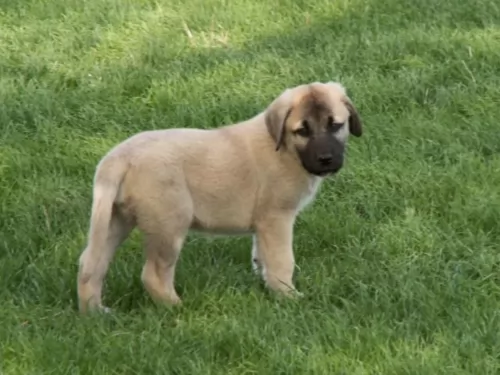 This is a large, heavily boned dog with a big head with a black mask and medium sized floppy ears. Looking at him, he has a Mastiff-like appearance but isn't as heavy as some Mastiff breeds, allowing it more speed and agility.
This is a large, heavily boned dog with a big head with a black mask and medium sized floppy ears. Looking at him, he has a Mastiff-like appearance but isn't as heavy as some Mastiff breeds, allowing it more speed and agility.
He stands at roughly 72cm to 85cm male and female, and weighs about 50 to 63kg. He has a solid double coat of dense hair which is a pale tan color.The coat is short and dense. The Kangal Dog is powerful and when he is alert, the long tail is held over the back, otherwise he holds it down with a slight curl.
The Kangal is known for his good looks, but he is also alert, sharp, territorial and confident, while also being calm. These dogs have an instinctive wariness of strange dogs and they are also reserved with strangers but are loving, loyal and protective with their human family.
In fact, the Kangal Shepherd Dog is protective while being gentle with small children and animals. He is an intelligent breed too, and having him trained and socialized won’t be a problem.
It is always a wise move to have a big dog like this trained and socialized, making him obedient and even more amicable than he already is.
 The English Mastiff is very happy to play with children. You willl need to be careful with small children as he does not know his size and is likely to sit on them.
The English Mastiff is very happy to play with children. You willl need to be careful with small children as he does not know his size and is likely to sit on them.
This lovable giant is noble and loyal. He will protect his family and he will be courageous about it.
This is a big dog but he doesnt live outside. You need a big yard and perhaps a big house. He may not adapt to an apartment.
The English Mastiff is smart and certainly trainable. He can be independent and stubborn at times but he has the ability to learn.
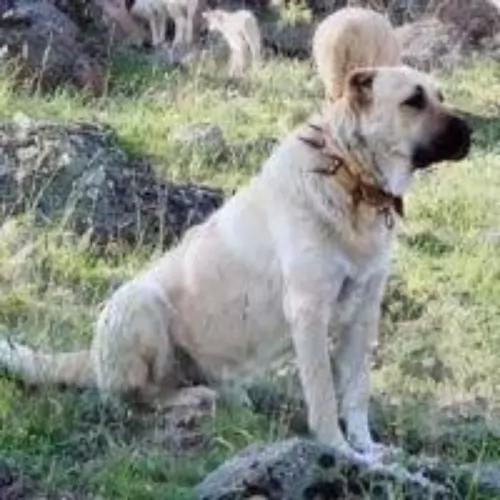 Your Kangal Dog is a big, powerful dog. His very size size won't suit him living in the city in small spaces and tiny gardens. He is far better suited to life in the suburbs or to country life where he can move around easily.
Your Kangal Dog is a big, powerful dog. His very size size won't suit him living in the city in small spaces and tiny gardens. He is far better suited to life in the suburbs or to country life where he can move around easily.
In spite of his size, he is a calm, balanced, independent, protective dog. He may well be aloof towards strangers, but a trained and well-socialized Kangal Dog is friendly, loving and loyal pet with his human family and with visitors to the house.
This is a beautiful dog and it will be an honor to have such a wonderful pet in your home. Treat him well and you're bound to have the most fantastic protector, guardian and friend.
 Being a massive dog can take its toll on the body’s development and that is certainly true of the English Mastiff. A lot of running is not recommended in the early life of the dog – preferable for the first two years. This could damage the joint’s growth plates and cause him a lot of problems in later years. Too much exercise in this massive dog can hurt him but so can, not enough exercise.
Being a massive dog can take its toll on the body’s development and that is certainly true of the English Mastiff. A lot of running is not recommended in the early life of the dog – preferable for the first two years. This could damage the joint’s growth plates and cause him a lot of problems in later years. Too much exercise in this massive dog can hurt him but so can, not enough exercise.
Some of the health issues other than this that the English Mastiff is prone to include:
A large dog like the English Mastiff is always prone to pain from arthritic joints. See your vet about pain medication.
A spot under the skin that is swollen and filled with fluid. Can be treated. It is not an infection or contagious.
Can result in lameness and arthritis.
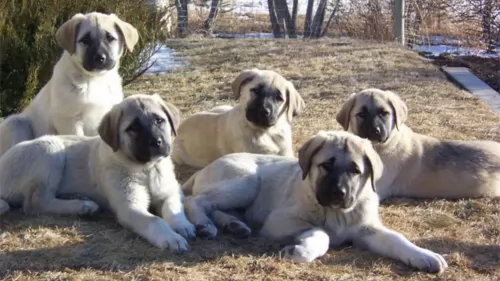 This is most important if you don't intend your Kangal Dog becoming a parent, and is good for the health of your dog.
This is most important if you don't intend your Kangal Dog becoming a parent, and is good for the health of your dog.
Your Kangal Dog puppy needs certain vaccinations at certain stages of his life to prevent him from getting some life threatening dog diseases. Keep a check on your dog's health and realize, that although the Kangal Dog is a healthy dog breed, he can develop canine illnesses such as eye diseases, ear infections, bloat, skin allergies and hip dysplasia among others.
Your dog may then require veterinary intervention to heal him of any of these.
To keep your pet happy and healthy, make sure to pick up your dog's faeces every day. This is for your own health's sake too.
 This is an enormous dog that grows quickly. It is important to feed them properly as they grow. If he doesn’t get what he needs as a puppy you will not be able to make it up to him later on.
This is an enormous dog that grows quickly. It is important to feed them properly as they grow. If he doesn’t get what he needs as a puppy you will not be able to make it up to him later on.
The English Mastiff puppy needs good nutrition for growing properly.
From 12-16 weeks of age feed him 3-4 cups a day of a high protein, high quality dry food. Break this up into 3-4 meals.
From 4 -6 months of age feed him 8-10 cups a day of a high protein, high quality dry food. Break this up into 2-3 meals.
From 6-18 months of age feed him 8-12 cups a day of a high protein, high quality, dry food. Break this up into 2-3 meals.
The English Mastiff is still growing from a year to 18 months. Starting at 18 months feed him 10-12 cups a day of high protein, high quality dry food. Break this up into 2 meals.
As your Mastiff ages, cut down on the protein and feed a dry food appropriate for his age.
The English Mastiff is a very large dog that should not be allowed to get obese since he is prone to dysplasia. He needs protein throughout puppyhood and until he is about 8-10.
This is a couch potato if you let him be. Make sure he gets at least one long walk per day or he will tend to gain weight. Play with them off leash about an hour every day.
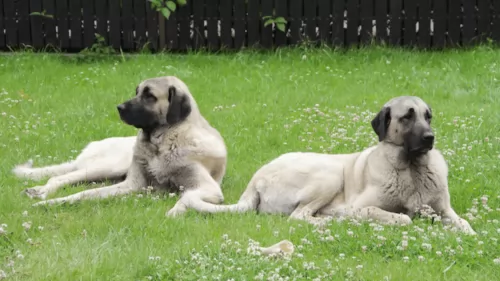 The Kangal Dog can be a wonderful pet in your home, but because you’ve made the decision to bring him into your home, it becomes your responsibility to ensure his happiness and wellbeing.
The Kangal Dog can be a wonderful pet in your home, but because you’ve made the decision to bring him into your home, it becomes your responsibility to ensure his happiness and wellbeing.
These ‘care’ tips can help you, particularly if you’re a first time dog owner -
Remember that a puppy will need 4 meals a day of soft, recommended puppy food. By the time your dog reaches his first birthday, one or two meals a day will be good.
There are some top quality commercial manufactured foods to choose from, and the packaging labeling will guide you to which one.
Adding in some home-made food such as nutritious cooked chicken, rice and vegetables will be a treat for your pet and don’t forget some raw meat occasionally too.
Fresh, cool water should be within reach of your pet around the clock.
Dogs need exercise to maintain their lean bodies but it will also stimulate their minds and keep them healthy. The exercise needs of your dog will depend on his size, age, health and breed type. Fun and games as well as daily walks will satisfy your Kangal Dog and keep him content.
Help keep your Kangal Dog looking groomed and cared for. He is a fairly heavy, seasonal shedder. Remove loose hairs with brushing the coat twice a week. Check for fleas and ticks at the same time and for any unusual lumps.
Every dog needs a warm, dry, quiet place to rest and sleep, inside and outside. Make sure that when your dog is outside that he has a place to rest in the shade and sun, as he chooses.